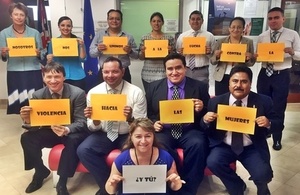Tackling violence; changing perceptions
The British Ambassador to Honduras, Carolyn Davidson, has written an article to commemorate the International Day for the Elimination of Violence against Women.

Elimination of Violence Against Women
My mother emailed me last week to say she had seen a British TV programme about Honduras which painted a dreadful picture. Called “The world’s worst place to be a woman?” it highlighted the high rates of violence against women and girls in Honduras, the lack of justice for victims and the impunity for their attackers.
The figures are mind-blowing – every 16 hours a woman is murdered in Honduras, according to a recent report by the Centre for Women’s Rights in Tegucigalpa. The figures for men being murdered are no better, indeed often far worse, but what makes the figures for women so chilling are that violence against women is most often perpetrated by those in relationships with them or part of their family group.
Pursuing and prosecuting the culprits should not be that difficult. And yet it does not happen. Why not? Because in Honduras, as sadly in many countries around the world, women remain the subject of discrimination. Their lives are not seen as important as those of men; their “complaints” are not given priority or they are thought to “have been asking for it” because of their behaviour – the sort of “moral” judgements never made against men.
This is particularly pertinent today as 25 November is the official International Day for the Elimination of Violence against Women. The UN estimates that one in three women worldwide has suffered physical or sexual violence, principally by someone close to them.
More than 700 million women alive today were married as children. 250 million of them were married before the age of 15. Today marks the start of a global campaign of 16 Days of Activism against Gender-Based Violence campaign, which will end on 10 December – Human Rights day – when the international community marks the anniversary of the Universal Declaration of Human Rights.
Ending violence against women and girls is a priority for the UK both at home and overseas. The UK pioneered the Preventing Sexual Violence in Conflict initiative under our previous Foreign Secretary William Hague. Human rights work by our embassies and high commissions overseas promotes and supports women’s rights, as well as the rights of many other disadvantaged groups.
In Honduras this year we have been working with Oxfam and the Women’s Association against Violence towards Women to improve how violence against women is reported in the press; to sensitise journalists (and wider society) to the impact their reporting can have and to impress upon them the influence they bring to bear on how society responds to such outrageous violence.
On Friday I shall be taking part in the award ceremony for the project in Tegucigalpa, recognising the best pieces of journalism and photography on this theme. I am very glad I haven’t had to be one of the judges, because I think the quality of work submitted has made it a tough decision. I am also delighted that the School of Journalism at one of Tegucigalpa’s key universities has been involved in the project. Educating journalists of the future will be crucial to driving change.
At least I am able to tell my mother that while the situation is deeply worrying, here in Honduras, as globally, the UK is taking action to make the world a safer place for women.